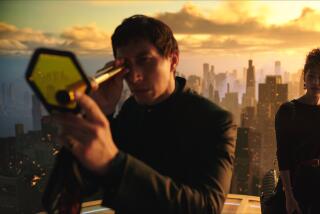Review: Alain Resnais’ ‘Stavisky’ has a fizzy charm all its own and a new resonance
- Share via
The 1974 film “Stavisky,” an elegant Art Deco bath with Jean-Paul Belmondo swanning around as a romantic 1930s swindler, isn’t paraded much in considerations of the brilliant French filmmaker Alain Resnais, who died in 2014 at age 91.
Perhaps that’s because its box-office popularity at the time, its status as a commercial rejuvenation for the formally inventive director, gives it a superficial glow easily overshadowed by Resnais’ more burnished artistic achievements.
When provocative masterpieces “Night and Fog,” “Hiroshima Mon Amour,” and “Last Year at Marienbad” mark your early career, and your 21st-century twilight is a string of delightfully sad/funny, ensemble-driven comedies and musicals (“Same Old Song,” “Private Fears in Public Places”), the breezy period con-artist tale in the oeuvre’s saggy middle isn’t likely to make the must-get-to-know list.
But now that it’s been given a 4K restoration and a theatrical re-release, “Stavisky” can be appreciated for what it is – a deceptively ruminative entertainment with a fizzy melancholy, and awash in sensory pleasures. Those include, but aren’t limited to, longtime Resnais cinematographer Sacha Vierny’s feathery whites and fulsome reds, and a rare film score by stage musical god Stephen Sondheim, evoking the era — and any given scene’s emotions — with a pulsating melodic grace.
Russian-born, French-raised and Jewish, the real-life Serge Stavisky (Belmondo) was an inveterate crook who, after a brief prison stint in the 1920s, reinvented himself as a well-connected financier and showbiz impresario who used fraudulent millions from phony bonds and jewels to buy newspapers, own cops and bribe politicians, but also fund a lavish lifestyle that made him a minor celebrity.
We meet Stavisky in 1933 as Serge Alexandre, a well-tailored, gregarious man of larcenous wizardry, grand gestures for his fashionista wife Arlette (a glittering, Yves Saint-Laurent-bedecked Anny Duperey), and relaxing chumminess toward aristocratic sponsor Baron Raoul (Charles Boyer, in a choice final role). But Stavisky/Alexandre is also a figure haunted by his scandalous past (occasionally glimpsed in flashbacks) — notably an upstanding father mortified enough to commit suicide — and concerned about a deepening probe into his activities by a dogged investigator (Claude Rich). Until he can be caught, however, he’ll keep his precarious schemes going. But as flash-forwards to a parliamentary inquiry reveal, exposure and violent consequences are closer than he realizes.
With its luxe trappings — hotels, casinos, the theater, the Basque coast, country manors — and between-the-wars setting of instability and rising anti-Semitism, plus a preoccupation with death, “Stavisky” has a perfumed tension that keeps the movie’s jaunty, old-glamour sheen from being entirely bask-worthy. For one thing, Leon Trotsky’s concurrent Parisian exile is a subplot, one that touches on what “l’affaire Stavisky” and its revelations of corruption eventually triggered (but which aren’t dramatized): ideologically minded riots in 1934 that sent France further down a darkly polarizing historical path.
Does knowledge of French political history help in comprehending “Stavisky”? Probably. And yet, Resnais is also satisfied to simply play maestro to a sophisticated, time-shifting portrait of illusory wealth and its elegiac side effects. Belmondo is great fun, simultaneously charismatic and boyishly enthused, but never far from a stare that suggests an abyss is at hand. He’s matched by Boyer’s timeless allure as the weary cynic. There’s also the great Michel Lonsdale as a doctor confidant with an increasingly worried mien, and, in a bit role, a young Gerard Depardieu.
The current machinations of the rich and powerful being what they are, it’s impossible to watch “Stavisky” without thinking of our own prominent capitalist con men, and the air of befouling greed and blasé swank that still hypnotizes today. It’s what may give Resnais’ nonchalant nostalgia piece a curious new resonance.
------------
‘Stavisky’
In French with English subtitles
Rated: PG
Running time: 1 hour, 57 minutes
Playing: Starts Friday, Laemmle Monica Film Center, Santa Monica
See the most-read stories in Entertainment this hour »
Movie Trailers
More to Read
Only good movies
Get the Indie Focus newsletter, Mark Olsen's weekly guide to the world of cinema.
You may occasionally receive promotional content from the Los Angeles Times.






